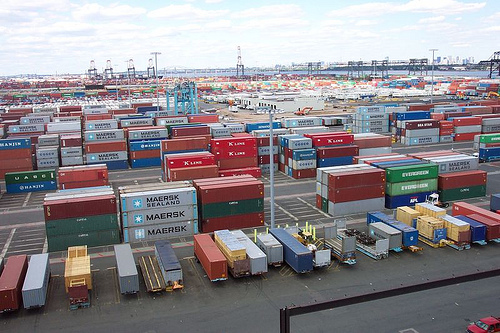 Photo: Michael Allen Smith With the 10th anniversary of the 9/11 attacks behind us, it’s fair to say that all Americans — not just those who have lost loved ones in Iraq and Afghanistan — have been affected by the ill-conceived “War on Terror.”
Photo: Michael Allen Smith With the 10th anniversary of the 9/11 attacks behind us, it’s fair to say that all Americans — not just those who have lost loved ones in Iraq and Afghanistan — have been affected by the ill-conceived “War on Terror.”
Surprisingly, even the food system didn’t go untouched. A new investigation by the Associated Press (AP) details how our obsession with stopping terrorists, real and imagined, from entering the U.S. during the decade after 9/11 cost the country and its consumers billions of dollars. In a few cases, this obsession has also led to broad, unnecessary exposure to toxic chemicals.
It was all caused by a mass reassignment of Department of Homeland Security (DHS) agricultural inspectors and scientists to anti-terrorism duty. People whose jobs it had been to protect our borders from illegal shipments of food, seeds, and plants that might harbor invasive species were replaced by bureaucrats who didn’t appear know an invasive species from a bumblebee.
In the wake of the move, the number of people intercepting pest-infested packages and products dropped by nearly 30 percent. Meanwhile, as recently as 2008, one-quarter of the inspector jobs at DHS remained vacant. And the effects of this failure were impressively broad. As entomologist Mark Hoddle from the University of California, Riverside told the AP:
Whether they know it or not, every person in the country is affected by this, whether by the quality or cost of their food, the pesticide residue on food, or not being able to enjoy the outdoors because beetles are killing off the trees.
But it isn’t just people who might be hurt. In California, a common response to a pest that threatens agricultural crops is often aerial spraying — even over residential areas. That happened in the Monterey Bay area during an attempt to stop a New Zealand light brown apple moth infestation. 1,600 pounds of pesticide were used, which “drew complaints that it caused respiratory problems and killed birds.” Despite a $110 million price tag, the effort was a failure and the moth infestation persisted.
Most disturbingly, however, is the report of the inspector who uncovered an illegal shipment of citrus cuttings infected with canker — a fungus considered powerful enough to threaten California’s entire citrus industry should it become established:
He showed it to a supervisor, who, according to the Congressional Record, replied: “Look, we are here to protect the country from acts of terrorism. What do you expect me to do?”
The inspector sidestepped the supervisor and called the USDA. The resulting investigation ended with arrests and the incineration of 4,000 potentially infected trees that had been growing at an unregistered nursery in a prime citrus region.
But within a month, the whistleblower was demoted to search through the dirty laundry of passengers returning from foreign trips.
Oy. The good news is that DHS has recognized its past failures and is committed to putting more resources into battling invasive species. Of course, that won’t help farmers affected by the 30 species who snuck in to the country last year (compared to eight in 1999).
It’s likely that we will always be “under attack” from invasive species. Two of the biggest threats — the Asian carp in the Midwest and the brown marmorated stink bug, which lives throughout the country — came in before 9/11 and will be with us for years to come. But what happened with the Department of Homeland Security, like so much of post-9/11 anti-terror government policy, can only be described as a self-inflicted wound.


